- Home
- Andrew Wareham
Nobody’s Child Page 2
Nobody’s Child Read online
Page 2
That was good enough for me. A job and adventure too – what more could a boy ask for? I discovered that just a few days later.
“Thank ye, sir. I’m with you.”
“So be it, Giles Jackson. Can you obey orders, boy?”
I nodded.
“Good. You will have a couple of guineas advance on your take and the supercargo himself will lead you around the chandlers to purchase as you need. Seafaring clothes and such, that is.”
I thought that to be no more than was normal treatment of a new hand. Captain Marker felt an obligation to me, however, and that made my joining ship far easier. In fact, it made it possible for me to go to sea as there were few berths available in the years after the end of the American War with the Navy sending its crews ashore.
Captain Marker drank up and returned to the ship, presumably thinking it polite to the constables not to be present when they scraped his assailant out of the gutter.
“’Jenny Dawes’, my ship. Named for my granddam, what was a fine old lady. A brig, as you will see, of some two hundred tons. Pierced for eight guns and a chaser. Six-pounders on the broadside and a nine as a chase piece. Not that we use the guns except as we are forced to.”
At that time I knew nothing of the trade. Later I discovered that a privateer used her guns as little as possible for fear of damaging hull and cargo and reducing the worth of her prey. There was a risk of sinking the capture as well, spending out on powder and ball for no gain. The intention always was to take by boarding, which could cost a life or two but was cheaper than playing the Navy’s game.
The supercargo took me in hand – not literally; despite being a sailor he was not of that persuasion. He looked like a schoolmaster, short and stooped, and actually possessed reading spectacles.
“I am Jeremiah Marker and understand that you may have saved my younger brother’s life. You are Giles Jackson and I owe you my thanks, I believe.”
“I could not watch a man be stabbed in the back, sir. I acted without thought so there is little need for thanks, sir.”
He seemed pleased by the disclaimer.
“I am Jerry. You are Giles, or do you prefer Jack?”
“Giles, if you will be so good, Jerry.”
“Giles it is. We will eat ashore until we sail – no point to taking ship’s rations before we must. I have a few things to do yet today…”
“Can you show me, Jerry? If I am to work with you, then the sooner I start, the better.”
It was the right thing to say, as I had hoped.
The supercargo dealt with trade and stocking and storing the ship, much as a purser did in the navy. There were some differences, Jenny Dawes carrying a cargo outward bound and intending to run goods ashore along the mainland colonies of South America. The Spanish had never opened their ports to foreign traders, which meant smuggling, but they also traded far too little legally – the rich colonists could not purchase their luxuries from Spain. Smuggling was not too great a risk provided one kept a reasonable distance from the few large ports.
“Pottery and chinaware both sell on the Spanish Main. There are few kilns in the colonies, for some reason, and even fewer in Spain itself. Iron goods – pots and pans, needles and pins, shovels and hoes – all are at a premium. We can sell to land smugglers at three times the price we pay for ironware. Glass is difficult to carry and run across a beach, but there is almost none made in the Spanish lands. It has to be wrapped thick in straw and takes up too much space because of that, but it is worth our while to take a few chests – it keeps the land people sweet. Besides that? They ask for gunpowder, I am told, but be damned if we are to sell that to the Dons! They will use it to fire at us, like as not.”
I had read, as had every literate boy, of the wickedness of the Spanish papists. I could not approve of the very idea of selling powder to the traditional enemy of English liberty.
“Are we to trade with the Dons, barter you might say, or do we take gold from them, Jerry?”
“Mostly we take gold and silver, but we will buy fresh food as well, if we can. After leaving their coast it is a long haul to the Indies. Depending on the time of year and how long we spend there, we shall round Cape Horn or go east about past Good Hope, all as it turns out. We will not wish to try the Horn in their winter, that is for sure, but if it should be possible, then we might wish to indulge ourselves with the Spanish trade along their Pacific coast. There can be rich vessels there, and innocent, having no expectation of a ship of war in those waters.”
“Are we at war, Jerry?”
“’No peace beyond the Line’, so they say. England may not be at war with Spain, but Spain is never at peace with us, Giles.”
I was not about to argue – Jerry knew more than me about such matters.
He took me ashore to something he called a ‘coffee house’, where men lounged and read newspapers and chatted in one part, and ate good meals in another room, all accompanied, naturally enough, by bowls of coffee. I had never met up with the brew before but afterwards counted it a poor day that I did not drink one pot at least. I still drink my coffee, although my doctor is much set against it.
To hell with doctors, most of them fly south in the autumn, quacking merrily.
In the morning, as promised, Jerry took me to the rounds of the chandlers. I knew nothing of Poole but soon discovered that the quay and the High Street were lined equally, one and one it seemed, with taverns and ship’s chandlers, a rare sight for a sheltered boy.
I saw spears in the windows of two separate stores, to my puzzlement.
“Harpoons, Giles, for the whaling trade. Poole sends ships to the Greenland Fishery and there is word of an expedition south as well, to the waters we shall traverse. A voyage of three years, perhaps, to the Great South Sea. It will pay well, so they say. Not to my liking, however.”
I knew nothing of whaling; I am happy to say I have remained ignorant of the trade. I have seen whales in my time – majestic creatures. I have no need to kill them.
Jerry bought me breeches and thick shirts and a woolly jumper for the cold nights and a fearnaught jacket to keep me dry. I suspect he spent more than two guineas, but he did not say and I did not ask. He had an affection for his brother, that I know, and felt a gratitude towards me.
There were pistols and cutlasses in plenty. When I asked about them, Jerry told me that the ship would supply my needs until I was able to win my own.
“Knock a man down in a boarding and you have the right to his weaponry, Giles. Many of the hands carry French and American swords and hand guns.”
I immediately realised that to be a mark of distinction, an announcement that one had killed a man in battle. I wanted to be accepted as a man, the peer of any aboard. Fortunately, I had sense enough to keep my mouth shut and wait for my actions to speak for me. The hands had little use for blowhards, forever shouting their mouths off, so I discovered.
Captain Marker had allocated me a cabin, a tiny hutch aft with the warrant officers. It was no more than seven feet long by five wide and high, tucked away in a row with four others beside the great cabin where all of the officers, captain included, ate and lounged off-watch. There were three other and larger spaces for the captain and the two mates to sleep, forward of the great cabin. It was not like the navy where, I was told, the captain dwelt in isolation from his people.
The bulk of the hands lived in the forecastle and messed between the guns, much as in the navy, but there was far less of the rigid order the navy demanded.
I put my purchases away in the little locker beneath my cot and decided that I might well like the new life I had fallen into.
Chapter Two
Nobody’s Child Series
Nobody’s Child
“We sail in the morning, Giles. Last day ashore in Old England for a year or two, or more. Or for a lifetime, maybe. Final stores came aboard yesterday. Make up the water today. The boarders all join this forenoon.”
The sailors had returned from their leave a
shore during the previous week, had been busy in the rigging or storing the hold for days. Jerry had explained to me that the boarders were generally short of nautical skills and would be in the way while Jenny Dawes was in port; they would come off shore last thing, a full score of them.
“Boarders are more nuisance than they’re worth, apart from when they’re boarding or working over the warehouses of a small harbour. Most of ‘em are too stupid to know anything more than how to bash a Frog over the head with a big club. Those who ain’t thick as a brick are crazy – complete loonies who do the job because they enjoy the chance to kill people on the legit.”
I had not heard the word ‘legit’ before, had to have it explained as ‘lawful’, permitted as an indulgence in wartime.
“They like killing, Jerry? What are they?”
“Loonies, like I said, Giles. There’s only a few jobs available for their sort in time of peace – hangman and such – so they mostly have to amuse themselves with murders on the sly. There’s always street children – kinchin, they call ‘em – who ain’t noticed when they go missing, but they don’t put up much of a fight, so I gather. Hand to hand, blade and bludgeon, blood splashing – some of them enjoy that. We need ‘em, but we don’t want ‘em, Giles. Keep ‘em on a double ration of rum and well-fed – makes ‘em to sleep longer. Apart from that, one of them’s got a violin – good with it, too – and another plays the trumpet, so they can entertain themselves, singing and dancing and such.”
I had never heard the like, but then, I was no more than a schoolboy in experience. I watched with some fear as they arrived during the morning.
Most of the boarders had enjoyed their last night ashore, staggered aboard hungover and stale-smelling, disappearing below after making their marks on the roll and knuckling their foreheads respectfully. I stood next to Jerry as he recorded them in his ledger, nineteen men as contracted and one replacement.
“Beg pardon, sir, but my brother Bob ain’t ‘ere to join like what ‘er agreed to.”
The accent was thicker than that, pure Dorset farmhand, muttered low and quiet as was their way. No point trying to write it out.
“I come in ‘er place, like.”
“Why?”
“Bob ‘ad a fallin’ out wi’ squire, sir. In the clink in Dorchester, waitin’ on trial, so ‘er do be. Like to get ‘er neck stretched, for takin’ squire’s ridin’ crop what ‘er waved at ‘er and givin’ the old bugger a right old thrashin’ with ‘un. My old Mum said better I comes in Bob’s place than stays to finish what ‘er started wi’ squire.”
“So be it. What is your name?”
“Fred, so I be, master.”
Jerry wrote Fred onto the list and gave him the pen to scrawl a big wavering ‘X’ against it.
“Listen to Captain Marker when he speaks to you all later, Fred. Do as you are told and do not fight other men in the crew. You will receive one share on this voyage. If you are asked to stay for another, you will get more.”
I glanced at Fred, caught his eye and grinned. He smiled back, relieved I think to have been accepted. He was smaller than me, scrawnily built, and I suspected little my elder.
Jerry explained his immediate acceptance of the young man, who seemed at a glance to be neither stupid nor lunatic.
“We generally take brothers in place of those who cannot return to us, Giles. In the nature of things, boarders are not peace-loving souls and they often fall into trouble ashore. Young Fred will put on weight fast and will do his work. He is young, so will have no qualms doing what he is told.”
I wondered why Fred might be expected to get bigger and Jerry explained that he would likely have seen meat once a month, if he was lucky, growing up in a farm labourer’s cottage.
“Our rations ain’t elegant, you might say, Giles, but there will be salt pork and beef four days of the week, and bacon and cheese on the remaining three. They will have peas and beans besides and twice-baked hard bread as well. On top of that there are dried apples and pears and cider and perry to drink, for being good for them, or so it is said. West Country ships always have the fruits aboard. The thing is, Giles, that he will eat more of meats in a week with us than in six months at home, and he will grow big and strong.”
I never saw scurvy aboard Jenny Dawes, did not know what it was. Only the navy, which was mean with its rations, suffered scurvy and the boils and blains as well.
We went ashore to eat a last meal and Jerry took me from the coffee house up the High Street and around the corner to a secluded but large house on three floors. He knocked on the door and a large and powerful man opened to ask our business.
“Ah! ‘Tis thee, Mr Marker. Sailing tomorrow, master?”
“So I am, Silas. Mr Jackson is aboard as my second hand and to learn the trade with the Gunner as well.”
“Come inside, gentlemen.”
The house showed the signs of faded gentility; the painted walls might have been better for a wash.
Jerry opened a door into a large salon, disclosed half a dozen young ladies, distinctly under-dressed I thought, and one older female, large, once voluptuous but now merely overweight and sagging, and covered in powder and paint.
“Mrs Higgins, how do you do, ma’am?”
“Well indeed, Mr Marker. And who is the young gentleman?”
Jerry introduced me, producing a pair of golden guineas and making it clear that I was a novice in certain aspects of manly behaviour. Mrs Higgins smiled her kindest and selected a young lady for me and sent me off upstairs. By that time I had realised where I was and what must come next. I was much in favour!
Jerry led me off to the coffee house soon after dawn, my knees still a-trembling and myself much in need of sustenance. He explained that most sailors spent their last night ashore engaged in practical activities.
“It will be months before you so much as see another female, Giles. Best to store up a memory or two before you go off to work.”
It was good advice and I have taken care to follow it whenever possible since. Carpe diem, I believe the expression to be.
Sailing is a tedious business, for ordinary folk, that is. There are those who gain great pleasure from luffing their lees and suchlike activities, but I am not one of them. I must suppose that I have sailed farther than most, having sculled about the East Indies and China for a few years and off to the Americas more than once, down the Spanish coast, and into the Med, now I recall it, though that is not a location I have any love for – full of Italians and suchlike. But I have never taken any delight in the mere mechanics of persuading a ship to leave one location and reach another, hopefully the place one wishes to get to.
So, we sailed from Poole and missed Brownsea Island, which not every ship leaving the port achieves, full many of the masters and timoneers still cross-eyed drunk when they set off. A day or so later we called the coast of France – Finisterre, I suspect – and set a course to the south and west and saw no more of land for the better part of sixty days, or thereabouts.
The winds blew and the seas occasionally roared and I spewed with the best when the time was right and stretched out cooking in the sun when the chance arose. Mostly, I turned to the gunner and with Jerry and for the first time in my life actively used my brain to learn. I enjoyed myself, to my absolute amaze. Strange that hard work could be a pleasure, so I thought at first; after a while it seemed normal that I should like to keep brain and body busy. Still is, funnily enough. Supposed to be a gentleman of leisure now, but I’m damned if I can spend my days sat on my jacksie watching the world go by – but we’ll come to that in time.
The gunner saw small point in setting me to the great guns – I was too young, he said, to deafen myself and grow muscle and gain nothing else from the experience. He put me to the muskets and pistols, setting and repairing the locks and learning to load and fire quickly and well.
For pistols, the task was simple enough. Look at your target, both eyes open, point the pistol on the line of your finger and squ
eeze. You can always point your finger at anything you can see. So, provided you hold the pistol in line with your hand, you can always hit a target inside twenty yards. So I found, anyway. The gunner said that a pistoleer – for such he named me – aimed with his brain far more than with his body, and he might have been right at that. He was used to put a string round the neck of an empty bottle and dangle it from the forecourse yardarm and let it swing with the pitch and roll of the brig. It made an interesting task; by the time we reached the South American Main I could hit nine times out of ten.
The boarders each had a musket issued as well as a pair of pistols and a cutlass. Heavy, clumsy and poorly balanced, the military musket, but good enough for its purpose. The boarders were to rest their muskets on the rail and fire a volley together when about to jump aboard an enemy. Mostly, they did not attack ships in any case. The bulk of our work involved the taking of small harbours and looting the shore of all that was easily to hand. A volley from the muskets was a way of announcing our presence and causing a useful little panic.
The two months on passage gave the opportunity to train the boarders in their duties. Most of them knew what they had to do and for them it was just a case of waking them up for a couple of hours morning and afternoon and keeping them out of mischief. For the two newcomers, Fred and myself, there was a little to learn, particularly in the manage of a cutlass.
Being green hands, we naturally kept together. I was by way of being an officer in the making while Fred was a raw country boy and had no expectation of ever rising in the world. He became my follower. Still is, in fact. He’ll be laid out half asleep in the afternoon sunshine just now – my personal groom if I ride out, loader if I fancy a bit of rough shooting, second coachman if we go up to London. Wherever I’ve been, he’s been at my shoulder. Seems happy enough, too.
Where was I? Cutlass, that’s it. More to using a cutlass than you might think – it’s not just hack and slash as you might expect. The cutlass has a point, and that puts you an extra two foot back from the fellow you’re killing, which can be a good idea on occasion.

 A Killing Too Far
A Killing Too Far Killing's Reward
Killing's Reward A New Place
A New Place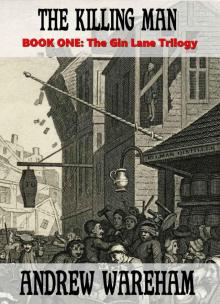 The Killing Man
The Killing Man Bold and Blooded
Bold and Blooded The Breaking Storm (Innocent No More Series, Book 2)
The Breaking Storm (Innocent No More Series, Book 2) Nobody’s Child
Nobody’s Child 04 Peking Nightmares (The Earl’s Other Son Series, #4)
04 Peking Nightmares (The Earl’s Other Son Series, #4) Red Man
Red Man Foreign Mud
Foreign Mud The Gathering Clouds (Innocent No More Series, Book 1)
The Gathering Clouds (Innocent No More Series, Book 1)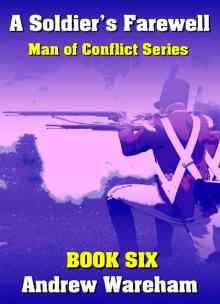 06 A Soldier’s Farewell (Man of Conflict #6)
06 A Soldier’s Farewell (Man of Conflict #6) Chinese Whispers
Chinese Whispers 02 Shanghai Dreams (The Earl’s Other Son #2)
02 Shanghai Dreams (The Earl’s Other Son #2) Hungry Harry: An Orphan in the Ranks
Hungry Harry: An Orphan in the Ranks A Wretched Victory (Innocents At War Series, Book 6)
A Wretched Victory (Innocents At War Series, Book 6) Illusions Of Change (A Poor Man at the Gate Series Book 6)
Illusions Of Change (A Poor Man at the Gate Series Book 6) The Wages Of Virtue (A Poor Man at the Gate Series, Book 8)
The Wages Of Virtue (A Poor Man at the Gate Series, Book 8)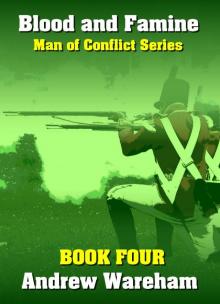 Blood and Famine (Man of Conflict Series, Book 4)
Blood and Famine (Man of Conflict Series, Book 4) The Friendly Sea (The Duty and Destiny Series, Book 1)
The Friendly Sea (The Duty and Destiny Series, Book 1)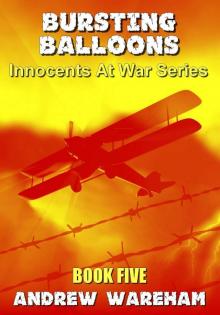 Bursting Balloons (Innocents At War Series, Book 5)
Bursting Balloons (Innocents At War Series, Book 5)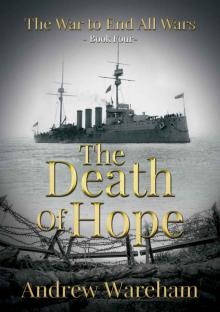 The Death of Hope
The Death of Hope Deadly Shores (The Duty and Destiny Series, Book 11)
Deadly Shores (The Duty and Destiny Series, Book 11) The Vice Of Virtue (A Poor Man At The Gate Series Book 10)
The Vice Of Virtue (A Poor Man At The Gate Series Book 10) Virtue’s Reward (A Poor Man at the Gate Series, Book 11)
Virtue’s Reward (A Poor Man at the Gate Series, Book 11)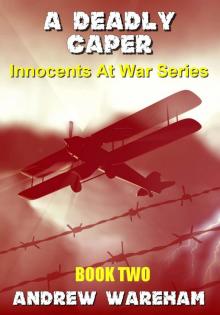 A Deadly Caper (Innocents At War Series, Book 2)
A Deadly Caper (Innocents At War Series, Book 2) The Pain Of Privilege (A Poor Man at the Gate Series Book 4)
The Pain Of Privilege (A Poor Man at the Gate Series Book 4) Far Foreign (The Duty and Destiny Series, Book 9)
Far Foreign (The Duty and Destiny Series, Book 9) Shores of Barbary (The Duty and Destiny Series, Book 12)
Shores of Barbary (The Duty and Destiny Series, Book 12) The Odd-Job Man (The Duty and Destiny Series, Book 7)
The Odd-Job Man (The Duty and Destiny Series, Book 7) Fire and Folly (Man of Conflict Series Book 3)
Fire and Folly (Man of Conflict Series Book 3) A Victorian Gent (The Making of a Man Series, Book 1)
A Victorian Gent (The Making of a Man Series, Book 1) Sugar and Spice (The Duty and Destiny Series, Book 6)
Sugar and Spice (The Duty and Destiny Series, Book 6)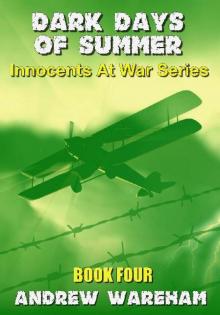 Dark Days Of Summer (Innocents At War Series, Book 4)
Dark Days Of Summer (Innocents At War Series, Book 4) Dire Shenanigans (The Making of a Man Series, Book 2)
Dire Shenanigans (The Making of a Man Series, Book 2) The Fuzzy-Wuzzy Man (The Duty and Destiny Series, Book 3)
The Fuzzy-Wuzzy Man (The Duty and Destiny Series, Book 3) Privilege Preserved (A Poor Man at the Gate Series Book 5)
Privilege Preserved (A Poor Man at the Gate Series Book 5)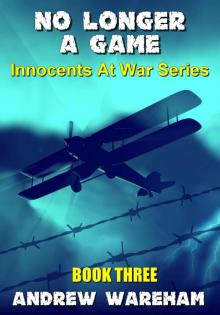 No Longer A Game (Innocents At War Series, Book 3)
No Longer A Game (Innocents At War Series, Book 3)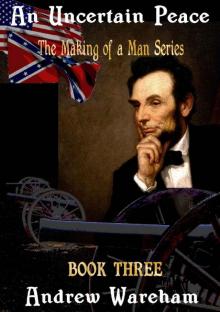 An Uncertain Peace (The Making of a Man Series, Book 3)
An Uncertain Peace (The Making of a Man Series, Book 3) Fortune And Glory (The Duty and Destiny Series, Book 5)
Fortune And Glory (The Duty and Destiny Series, Book 5) The Old Order (A Poor Man at the Gate Series Book 7)
The Old Order (A Poor Man at the Gate Series Book 7) A Place Called Home (Cannibal Country Trilogy, Book 2)
A Place Called Home (Cannibal Country Trilogy, Book 2) Nouveau Riche (A Poor Man at the Gate Series, Book 2)
Nouveau Riche (A Poor Man at the Gate Series, Book 2) The Privateersman (A Poor Man at the Gate Series Book 1)
The Privateersman (A Poor Man at the Gate Series Book 1) Britannia’s Son (The Duty and Destiny Series, Book 4)
Britannia’s Son (The Duty and Destiny Series, Book 4) Long Way Place (Cannibal Country Trilogy, Book 1)
Long Way Place (Cannibal Country Trilogy, Book 1) Spanish Tricks (Man of Conflict Series, Book 5)
Spanish Tricks (Man of Conflict Series, Book 5) A Parade Of Virtue (A Poor Man At The Gate Series Book 9)
A Parade Of Virtue (A Poor Man At The Gate Series Book 9) A Busy Season (The Duty and Destiny Series, Book 8)
A Busy Season (The Duty and Destiny Series, Book 8) Billy Bacon and the Soldier Slaves (Colonial Warrior Series, Book 1)
Billy Bacon and the Soldier Slaves (Colonial Warrior Series, Book 1) Raging Rajahs (Man of Conflict Series, Book 2)
Raging Rajahs (Man of Conflict Series, Book 2) Victorian Dawn (A Poor Man at the Gate Series, Book 12)
Victorian Dawn (A Poor Man at the Gate Series, Book 12) Born To Privilege (A Poor Man at the Gate Series Book 3)
Born To Privilege (A Poor Man at the Gate Series Book 3)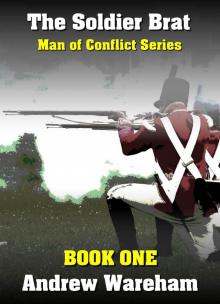 The Soldier Brat (Man of Conflict Series, Book 1)
The Soldier Brat (Man of Conflict Series, Book 1)